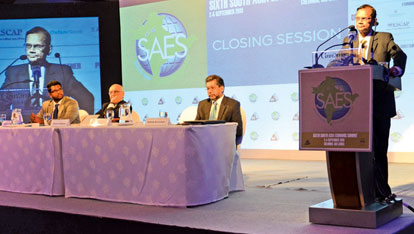SAES focuses on strong inclusive South Asia
The sixth South Asia Economic Summit (SAES), convened by the
Institute of Policy Studies of Sri Lanka (IPS), concluded in Colombo
recently.

Prof G L Peiris at the podium. |
The three-day Summit brought together over 120 dignitaries
representing the socio-economic spectrum of South Asia and beyond.
This year's Summit was centered around four key socio-economic policy
areas termed 'The Big Four', which explored the significance of
harnessing human capital through creating productive employment and
addressing migrant dilemmas; managing water resources, ensuring food
security and mitigating climate change; addressing intra-country growth
disparities in development and enhancing the importance of building a
competitive and inclusive private sector in the region.
Minister of External Affairs, Professor G.L. Peiris said that the
four key pillars chosen for discussion was 'undoubtedly the most
appropriate' in terms of highlighting the issues facing Sri Lanka and
the region.
He said that the state should "ensure that economic development does
not consist of theoretical abstractions which are remote from the lives
of ordinary people, but, on the contrary, have a real impact in terms of
improving the day-to-day lives of people living in all parts of the
country".
He emphasised the importance of developing the physical
infrastructure and modernising education to ensure economic development
and social equity in the country.
The Minister commended the valuable contributions made on the
development discourse in the region by various socio-economic experts.
He said that recommendations made on the basis of the deliberations
at the sixth SAES will receive the earnest consideration of the
Government.
The Summit which stimulated debate and discussion on a range of
development issues concluded with the naming of Research and Information
Systems for Developing Countries (RIS) in India as the host of the
seventh SAES next year. |

